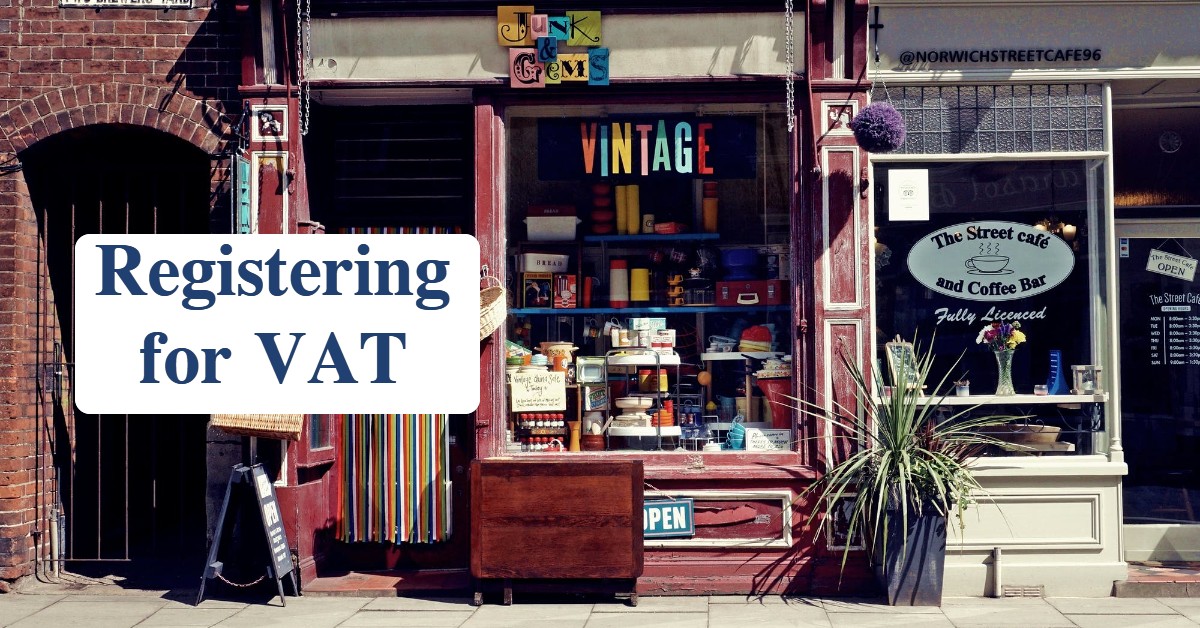VAT Registration Considerations
VAT registration is compulsory under certain circumstances, but businesses can also choose to voluntary register. We explore these options further below.
Value Added Tax (VAT) is a tax that is chargeable on certain goods and services.
- VAT is collected by businesses on behalf of HMRC and reported on VAT returns.
- Returns are made either monthly, quarterly or annually, dependent on how the VAT is set up.
Compulsory VAT registration
There are two main situations where VAT registration is compulsory:
- A business must register for VAT if taxable turnover for the previous 12 full calendar months exceeds £85,000.
Example:
If assessing the turnover part way through the month of May, say 5 May 2022, the assessment period would be 1 May 2021 to 30 April 2022. This being the full calendar months prior to 5 May 2022 that need to be assessed.
The business has 30 days to register for VAT, following the month that the turnover exceeded the threshold. In the example above, if turnover exceeded £85,000 during the twelve month period to 30 April 2022, then the VAT registration would be submitted by 30 May 2022.
The effective date of VAT registration is one month and one day, following the month that the VAT registration threshold of £85,000 was exceeded. Using the same example, one month and one day after 30 April 2022 would be 1 June 2022.
From the effective date of registration, the business would need to start charging VAT at the applicable VAT rate for the taxable supplies relevant to that business.
- Where taxable turnover is expected to go over the £85,000 within the next 30 days alone, then VAT registration must be submitted before the end of that 30 day period. The effective date of registration is the date it was realised that the turnover was going to exceed £85,000 and not the actual date the turnover exceeded the threshold.
Example:
If on 1 May 2022 it was realised that the taxable turnover was going to exceed £85,000 for May 2022, the VAT registration would need to be applied for by 30 May 2022. The effective date of registration would be 1 May 2022, meaning that VAT should be charged on sales from this date onwards. This could happen if you are scaling up the business and a new contract would push you over the limit.
Voluntary VAT registration
You may wonder why would anyone want to voluntarily register for VAT, if they don’t have to?
It can be beneficial for a business to register for VAT under certain circumstances as it can allow for input VAT to be claimed on purchases, where otherwise this wouldn’t be an option if not VAT registered.
For instance, a business that has taxable turnover where the applicable VAT rate is zero rated results in no output VAT being chargeable on the sales to customers, but it allows for VAT to be claimed on business purchases, which results in a refund of VAT to the business.
Increasing pricing to include the VAT element can affect the competitiveness of a business, as consumers may be able to find the same goods/services cheaper elsewhere if they use a non VAT registered supplier.
However, if the supply of goods and services is mostly to other VAT registered entities, then the increase in sales prices, to include the output VAT, will not affect the customer overall if they are VAT registered. They themselves will be able to reclaim this VAT as input VAT on their own VAT return.
Other considerations include the additional administration of recording the VAT transactions correctly and preparing VAT returns, which can be costly in terms of time or professional fees.
VAT temporarily exceeded the threshold
Where taxable turnover temporarily exceeds the threshold of £85,000 and is likely to be less than the de-registration threshold of £83,000 in the next twelve months, an exception can be applied for with HM Revenue & Customs.
A letter is written to HM Revenue & customs outlining the reasons why it is thought that taxable turnover will not exceed £83,000 in the next 12 months. It is at HM Revenue & Customs discretion as to whether to grant the exception.
If the exception is not granted the business will be registered for VAT.
Pre-registration expenditure for:
- any expenditure incurred before a business registers for VAT that will support the taxable business activities when it is registered, input VAT may be reclaimable.
- goods such as stock or fixed assets that were purchased in the prior four years to registration and still remain within the business as at the date of registration, input VAT can be reclaimed on these goods.
- services incurred six months prior to VAT registration, input VAT may be reclaimed on services obtained that relate to activity carried on at the time of registration.
How to register for VAT
The most efficient way to register for VAT is through an online application, this is something we assist our client’s with on a regular basis. We would strongly recommend seeking advice from an accountant if your business needs to register for VAT as specific knowledge is required surrounding the VAT preparation process.
Contact Us for Support
Contact us here for further guidance and we can help make the process as smooth as possible. Or call us on 01244 400244. One of our team will be happy to assist you.
Shaw Austin are a firm of Chartered Accountants based in Chester supporting independent business throughout the UK. We take the headache out of business accounting and taxation by providing our clients with a personal service.
This article includes rates, dates and threshold data, which are correct on date of publishing – these can change from year to year. This is a general article to assist readers. Professional advice should always be taken in respect of your personal circumstances.
Published July 2022

